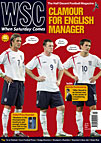 The appointment of Steve Staunton and Sir Bobby Robson has not met universal acclaim in Ireland, as Paul Doyle reports
The appointment of Steve Staunton and Sir Bobby Robson has not met universal acclaim in Ireland, as Paul Doyle reports
“Oh Christ, we’re doomed. Not Sieve Staunton, anyone but Sieve bloody Staunton!” Those were the exact words that resounded through the Lansdowne Road press room on June 2, 2001, when the team sheet revealed that partnering clumsy Richard Dunne in defence for the Republic of Ireland’s vital World Cup qualifier against Portugal would be 32-year-old Steve Staunton, a once-admired left-back who in recent years had become the personification of a tool with many holes but, mercifully, had hardly so far featured in this campaign. It was obvious that either Luis Figo or Staunton himself would tear the Irish defence apart.
Sure enough, within ten minutes Dundalk’s finest had tested Shay Given with a ludicrous diving header. But what happened after that was astonishing. Before our very eyes, this most porous of defenders transformed into a rock. He became solid, assured and, darn it, inspirational. Ireland drew and effectively qualified for the World Cup; the loon formerly lampooned as Sieve was the undisputed man of the match. After Roy Keane, of course.
Something equally extraordinary must happen if Staunton is to find success as Ireland manager. Sure, he’s a fiercely determined character who’ll command respect in the dressing room by dint of his excellent, middling, contemptible then excellent again playing career that spanned 102 caps. But he’s a virgin. He has never picked a team. Never devised a strategy. Never had to answer for anyone’s performance but his own. His four months as Walsall defensive coach didn’t quite teach him that much. Which is where Sir Bobby Robson comes in.
“This man, and I hope he doesn’t mind me saying this, is 72,” explained Staunton at his inaugural press conference. “If I don’t learn anything from him, then I’m not the right man for the job.” Fair enough, but if the old man’s so great, why not just give him the job? “Stan, and I hope he doesn’t mind me calling him that, is Irish and that’s very important,” replied Robson.
In the weeks since, there have been precious few details regarding the exact nature of Robson’s role. His title is “international football consultant” and we know he’ll take no part in training – former goalkeeper Alan Kelly and Aston Villa’s Kevin McDonald have been hired to do that. Staunton has hinted he’ll be called upon to give tactical advice and recommend substitutions in high-tension matches. But he then suggested Robson won’t be in the dugout and may not even attend all the games. The only other clue from the manager, who’s generally about as comfortable in front of the camera as he was under the scorching sun at USA 94, was that Robson will advise him on “the media and that”.
The appointments have divided fans. Those in favour of giving the odd couple a chance point to the way Stan reportedly united the dressing room after Roy Keane’s infamous departure from the 2002 World Cup (though Keane, of course, wasn’t so impressed, deriding Staunton as a “muppet”). They also like the pair’s clear enthusiasm for the job. And perhaps most important of all, they know there was no obvious alternative.
Those hostile to this idea, of entrusting the national team to a total novice and an absent-minded senior citizen who may or may not remember guiding England to the World Cup semi-finals 16 years ago, were further riled by Staunton’s announcement that he intends to exploit “the granny rule”. The critics’ controversial logic being that dredging through the diaspora was fine when we were trying to establish ourselves as a footballing nation, but now that we’ve had success at youth level and can call on emerging talents such as Manchester City’s Stephen Ireland, Bolton’s Joey O’Brien and Reading pair Kevin Doyle and Shane Long, we should be able to stand on our own two feet. Even broadsheet columnists have called on Stan not to venture beyond the second generation, sticking to players with Irish mothers or fathers rather than grandmothers and grandfathers.
These detractors, generally impatient sorts, were further alarmed by Staunton’s dismissal of the Euro 2008 qualifiers as a mere “bedding-down period” before the real target – the 2010 World Cup. He was more upbeat, however, after the draw. “It’s good, it could have been a hell of a lot worse,” he boomed after being pitted against the Czech Republic, Germany, Slovakia, Wales, Cyprus and San Marino. “Germany, like ourselves, are in transition,” he continued, “but they still did well to qualify for the World Cup.” Ah yes, Sir Bobby’s influence is starting to become clear.
From WSC 229 March 2006. What was happening this month